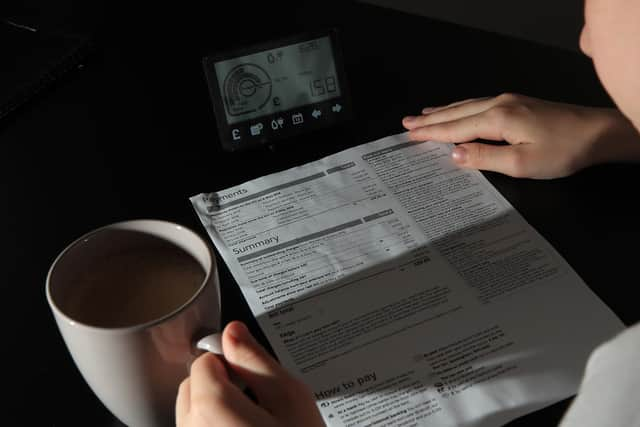Energy prices might be coming down but brace yourself for a winter of pain - Andrew Vine
Instead, all of us are braced for yet another series of painful bills for gas and electricity and another round of trying to rack our brains for energy-saving measures.
When Rishi Sunak hailed last week’s announcement that changes to the energy price cap would produce a fall in prices as great news for households, he was well wide of the mark.
Advertisement
Hide AdAdvertisement
Hide AdYes, the average annual bill will fall by £151 compared to last year, but that will still leave households having to find more than £1,900, which is a massive rise on the £1,200 they were paying only two years ago.


Sorry Prime Minister, but this winter’s bills are not going to be great news for anyone apart from the energy companies, which are making vast profits from inflated prices that are a source of despair for millions.
How many millions is truly shocking. Citizens Advice says 7.8m people had to borrow money to pay their energy bills in the first half of this year and a marginal reduction in prices isn’t going to make the months ahead any easier.
Far from matters getting better for households, as Mr Sunak would have us believe, this winter could be harder than the last.
Advertisement
Hide AdAdvertisement
Hide AdWe were lucky last year when the weather was relatively mild, but my bills nevertheless provided a nasty shock, even with the £400 discount for every household that went some way towards cushioning price rises.
But that is not being repeated, and while there is targeted support for pensioners and the poorest households, there are countless people out there who won’t qualify for help and face severe difficulties.
And with food prices still high, the months ahead are going to be – yet again – a time of worry about making ends meet, even to the extent of some people facing the awful choice between staying warm or eating, because they can’t afford to do both.
Once again, we’re going to see elderly people riding on buses for hours or spending the day in public buildings in order to stay warm, or relying on the kindness of community centres and places of worship to provide a hot meal because they are worried about the cost of using the oven or hob at home.
Advertisement
Hide AdAdvertisement
Hide AdThere is no end in sight. Energy analysts are predicting prices will rise again at the start of next year and forecast that they are likely to stay high for a decade.
We all know that Russia’s war on Ukraine disrupted international energy markets, triggering wholesale price increases. But it surely cannot be acceptable for the Government to effectively shrug its shoulders and say there is little it can do to help in the face of market forces, or for the energy companies we have no choice but to rely on to post record profits as a consequence of families struggling to pay bills.
The charity National Energy Action was right when it said there is a “mood of complacency” about the Government’s attitude towards energy prices.
Even the watchdog Ofgem has suggested that there should be a social tariff for the poorest customers, but nothing is being done to bring this about.
Advertisement
Hide AdAdvertisement
Hide AdThe Government should have the guts to stand up for consumers by demanding the energy companies do everything possible to bring bills down.
One measure they could take is addressing the ongoing scandal of standing charges for supplying gas and electricity, which are likely to rise to more than £300 a year.
These have risen repeatedly and amount to an insidious method of ratcheting up bills that leaves consumers helpless. Because standing charges are fixed costs, we have no way of cutting them however much we economise on gas and electricity use. Another change for the better would be to demand an end to the direct debit con trick which means customers who choose to pay when their bills arrive instead of shelling out money every month will pay £129 more a year.
Why should this be permitted? One of the features of the energy price hikes over the past couple of years has been customers complaining bitterly that their direct debits have been increased by eye-watering amounts, effectively providing energy suppliers with substantial pots of money on which they presumably earn interest. There is no reason why customers who prefer to pay their bills when they arrive should be penalised in this way.
Despite what Mr Sunak says, the Government is doing too little to demonstrate that it is on consumers’ side or understands the depth of worry energy prices cause.